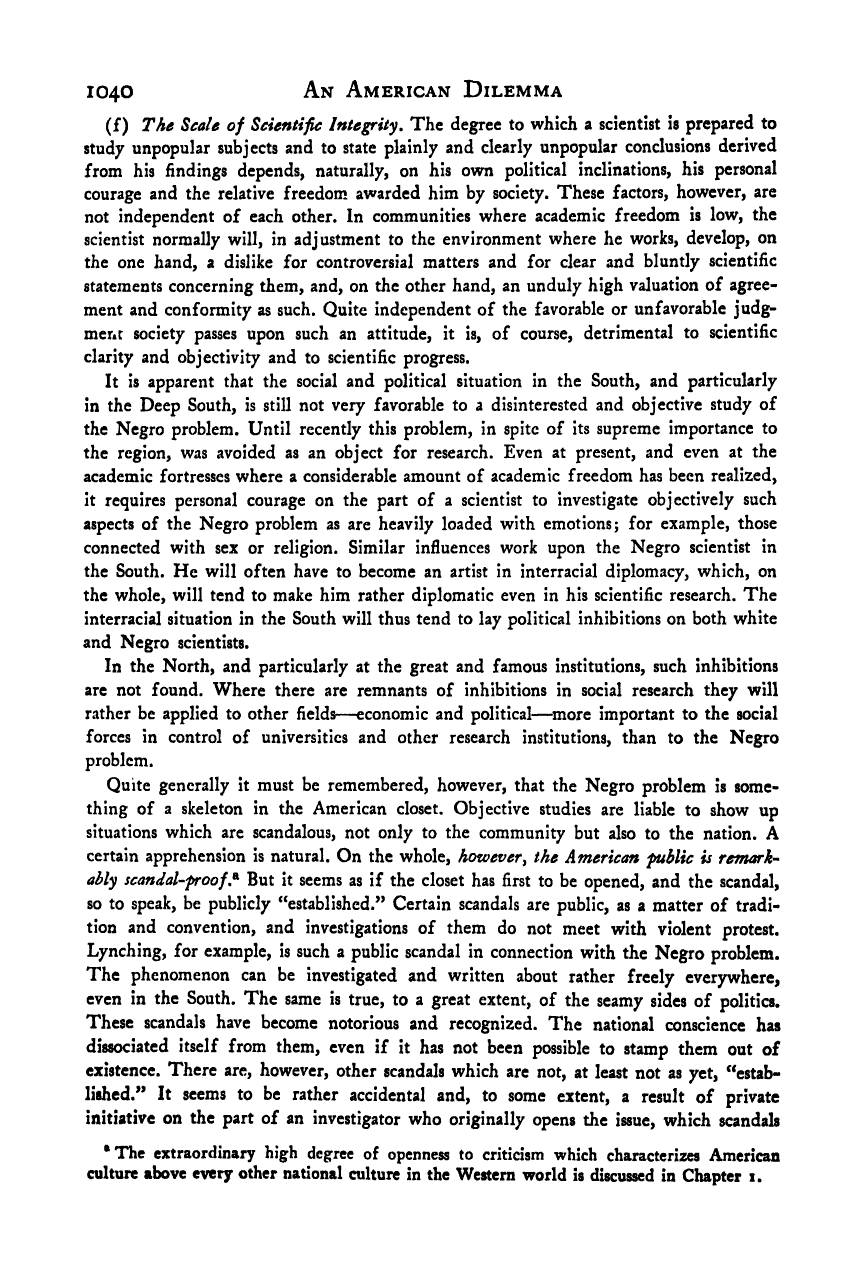Note: Gunnar Myrdal died in 1987, less than 70 years ago. Therefore, this work is protected by copyright, restricting your legal rights to reproduce it. However, you are welcome to view it on screen, as you do now. Read more about copyright.
Full resolution (TIFF) - On this page / på denna sida - Appendices - 2. A Methodological Note on Facts and Valuations in Social Science - 1. Biases in the Research on the American Negro Problem

<< prev. page << föreg. sida << >> nästa sida >> next page >>
Below is the raw OCR text
from the above scanned image.
Do you see an error? Proofread the page now!
Här nedan syns maskintolkade texten från faksimilbilden ovan.
Ser du något fel? Korrekturläs sidan nu!
This page has never been proofread. / Denna sida har aldrig korrekturlästs.
1040 An American Dilemma
(f) The Scale of Scientific Integrity, The degree to which a scientist is prepared to
study unpopular subjects and to state plainly and clearly unpopular conclusions derived
from his findings depends, naturally, on his own political inclinations, his personal
courage and the relative freedom awarded him by society. These factors, however, are
not independent of each other. In communities where academic freedom is low, the
scientist normally will, in adjustment to the environment where he works, develop, on
the one hand, a dislike for controversial matters and for clear and bluntly scientific
statements concerning them, and, on the other hand, an unduly high valuation of agree-
ment and conformity as such. Quite independent of the favorable or unfavorable judg-
ment society passes upon such an attitude, it is, of course, detrimental to scientific
clarity and objectivity and to scientific progress.
It is apparent that the social and political situation in the South, and particularly
in the Deep South, is still not very favorable to a disinterested and objective study of
the Negro problem. Until recently this problem, in spite of its supreme importance to
the region, was avoided as an object for research. Even at present, and even at the
academic fortresses where a considerable amount of academic freedom has been realized,
it requires personal courage on the part of a scientist to investigate objectively such
aspects of the Negro problem as are heavily loaded with emotions; for example, those
connected with sex or religion. Similar influences work upon the Negro scientist in
the South. He will often have to become an artist in interracial diplomacy, which, on
the whole, will tend to make him rather diplomatic even in his scientific research. The
interracial situation in the South will thus tend to lay political inhibitions on both white
and Negro scientists.
In the North, and particularly at the great and famous institutions, such inhibitions
are not found. Where there are remnants of inhibitions in social research they will
rather be applied to other fields—economic and political—^more important to the social
forces in control of universities and other research institutions, than to the Negro
problem.
Quite generally it must be remembered, however, that the Negro problem is some-
thing of a skeleton in the American closet. Objective studies are liable to show up
situations which are scandalous, not only to the community but also to the nation. A
certain apprehension is natural. On the whole, however^
the American piblic is remark-
ably scandal-froof,^ But it seems as if the closet has first to be opened, and the scandal,
so to speak, be publicly “established.” Certain scandals are public, as a matter of tradi-
tion and convention, and investigations of them do not meet with violent protest.
Lynching, for example, is such a public scandal in connection with the Negro problem.
The phenomenon can be investigated and written about rather freely everywhere,
even in the South. The same is true, to a great extent, of the seamy sides of politics.
These scandals have become notorious and recognized. The national conscience has
dissociated itself from them, even if it has not been possible to stamp them out of
existence. There are, however, other scandals which are not, at least not as yet, “estab-
lished.” It seems to be rather accidental and, to some extent, a result of private
initiative on the part of an investigator who originally opens the issue, which scandals
* The extraordinary high degree of openness to criticism which characterizes American
culture above every other national culture in the Western world is discussed in Chapter i.
<< prev. page << föreg. sida << >> nästa sida >> next page >>